

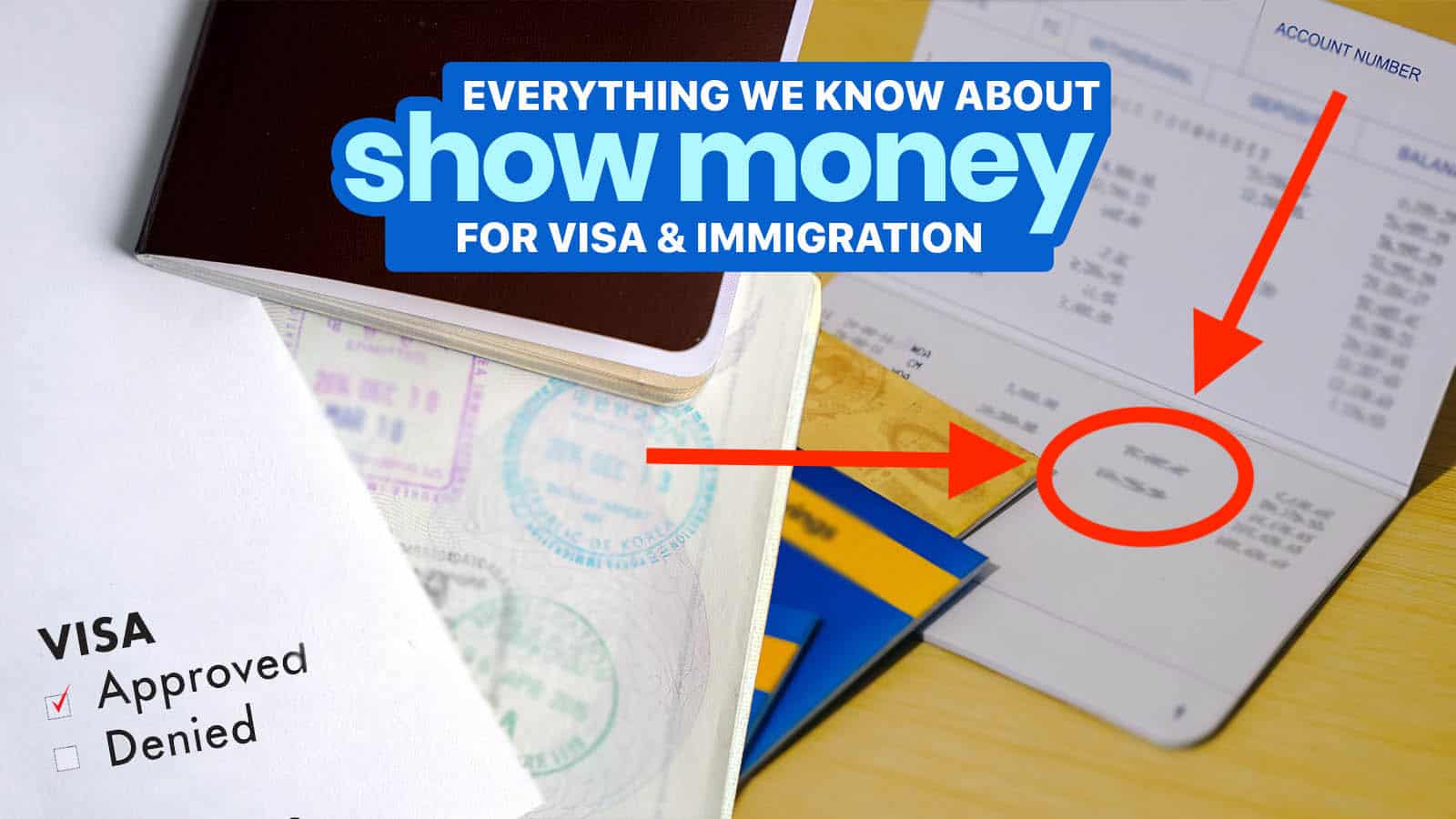
If I earned a dollar for every time I got that question, I would be pretty wealthy by now. Easily, this is the most frequently asked question on our social channels. We also make sure that we answer this in the FAQs section of our visa posts. Yet, we still get a lot of messages about it. It’s not difficult to understand why. Out of all the documents that embassies usually require from applicants, this is probably the most vague and the most complicated.

First of all, nothing and no one can guarantee approval of your visa application. You can have a huge sum on your account and still get denied a visa. Whether your application will be approved or rejected depends on a smorgasbord of factors. Yes, financial capacity is one of them, but it is JUST ONE of them. The other requirements have to be equally, if not more, satisfactory.
But how much is enough? In this article, I’ll try to answer in detail this burning question and all the other inquiries that we usually get about show money. I’m compiling everything that Vins and I know about the subject, so that we could have just one page to link to whenever we’re asked about it.
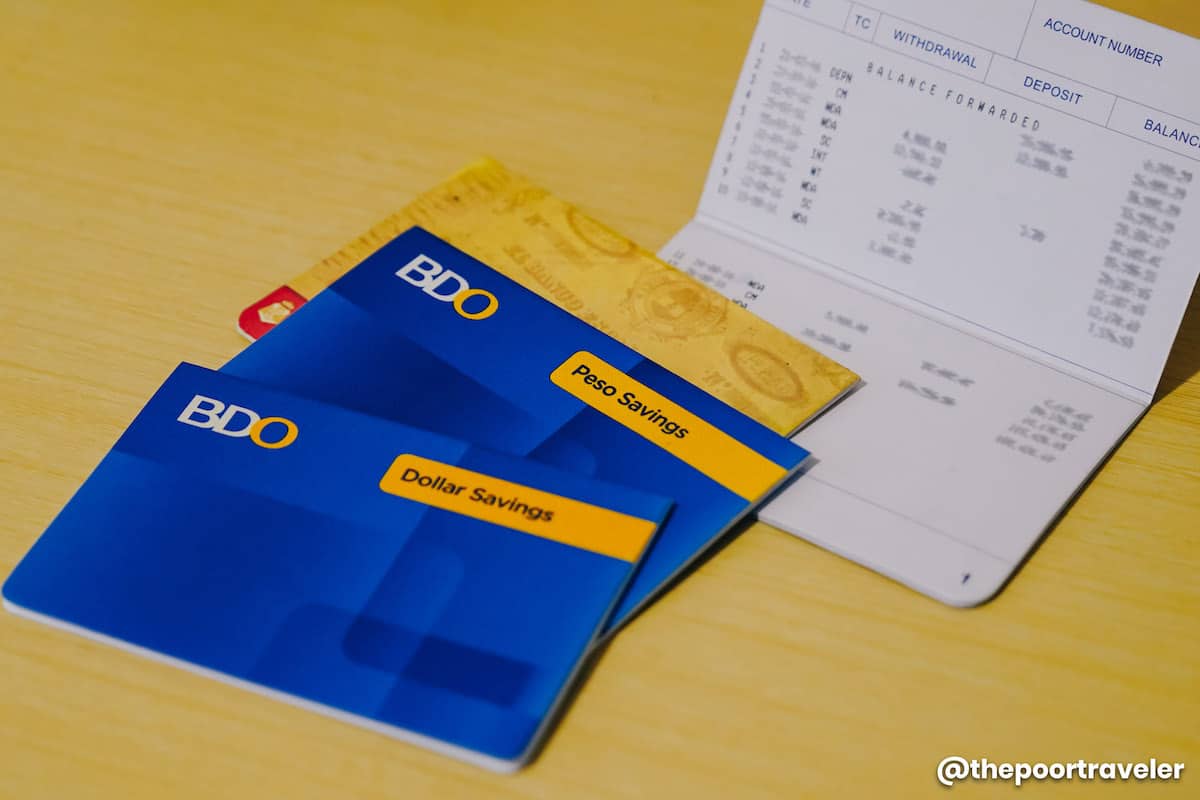
Note, however, that I don’t work for any consulate or embassy. All these are speculations based on the patterns and similarities we see in our applications, talks with travel agents, and experiences of our family, friends and members of our Support Group. Much of the evaluation process isn’t visible to outsiders. At the end of the day, it’s an exercise in making educated guesses.
So without further ado, let’s begin!
WHAT'S COVERED IN THIS GUIDE?
Show money is the colloquial term for the funds that you have access to when you travel. It’s called “show money” because you will need to show some proof of this amount, often in the form of a bank certificate or a statement of account. It’s NOT called show money because it’s just “for show.” The money that you present should be real and should be yours.
Most embassies require visa applicants to submit proof of funds. On the surface, it seems like they do so to make sure that applicants can sufficiently support themselves financially during the trip (financial capacity). But it is actually much deeper than that.
More than financial capacity, they’re also concerned about rootedness. Let’s discuss rootedness first because we will be circling back to it numerous times in this article.
Rootedness refers to how strong your ties are in your home country. This is often supported by employment stability, ownership of properties, and personal connections. But financial steadiness can also be a factor, and they can also look at your bank documents to check for it.
Remember, many applicants try to secure a tourist visa just for show, but once they’re in their destination, they will stay longer and work there. We, Filipinos, are notorious for it. We even developed a slang term for it: TNT, “tago nang tago,” referring to the act of constantly hiding from police or immigration authorities. In other words, you need to show that your life here in the Philippines is good and stable, and that you have no reason to overstay abroad.
They have all the right to reject anyone whom they suspect may not contribute to their economy or violate their laws. Having good financial standing is one of the ways you can minimize those doubts and prove to them that you have a good life here and that you have no reason to overstay or work in their country.
But there are cases wherein Immigration Officers ask for it too, depending on the country. I’ll talk more about that below.
It’s simple: Get a bank certificate or bank statement or both.
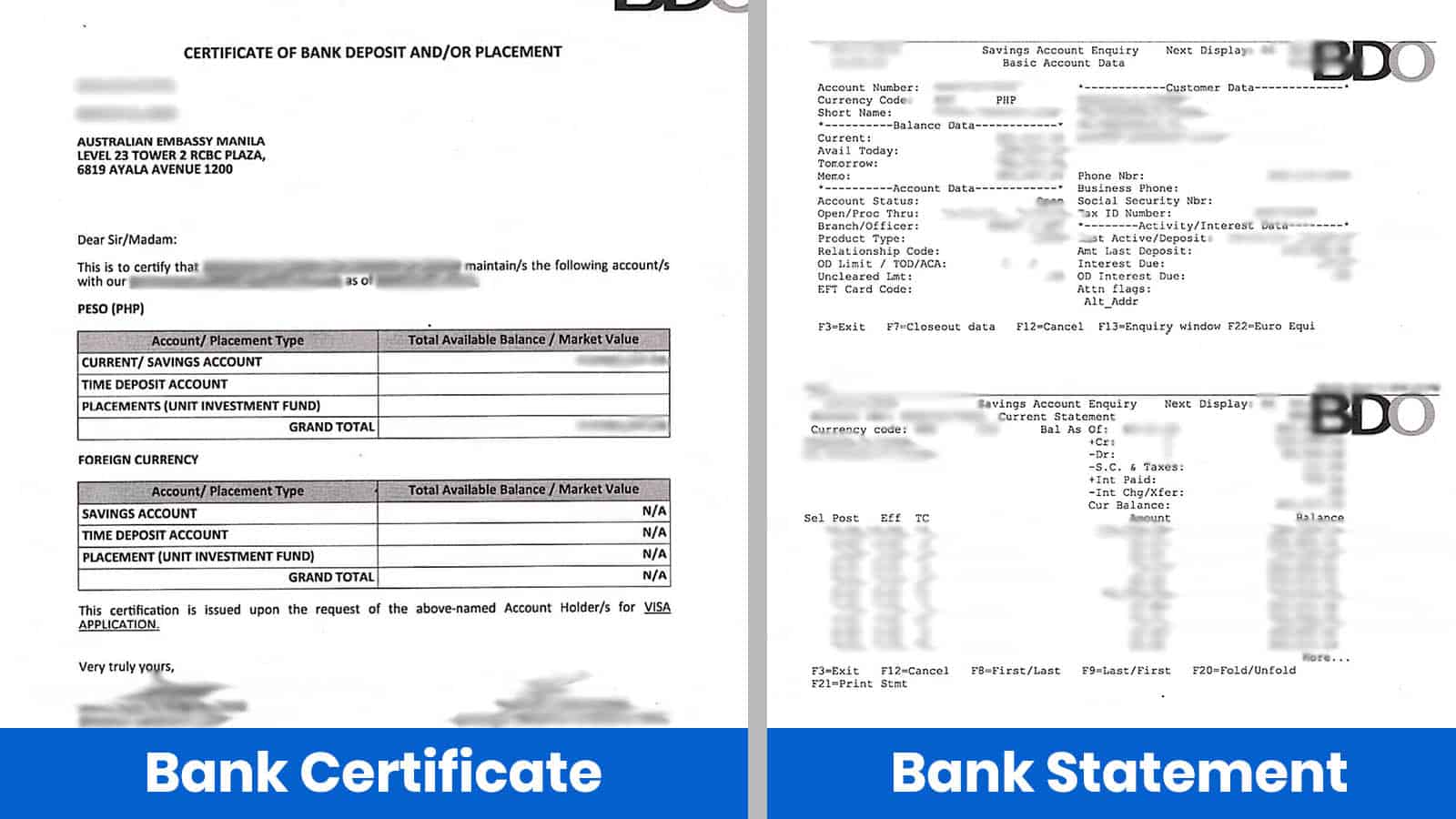
Different embassies have different rules. For example, the Japanese Embassy needs only the bank certificate. The Australian and Canadian Embassies require only the bank statement. The Chinese, Korean, and most Schengen embassies ask for BOTH certificate AND statement.
The period that must be covered also varies. For Korean visa, you need to present the transactions within the past three months. For Canadian visa, four months is sufficient. For Chinese, Schengen and most other visas, six months is the standard.
The rules vary from bank to bank. For example, in my experience, BDO requires that you secure these documents from the branch where you opened your account. You can’t get one from any other branch. I have tried many times but they always require me to personally appear at my branch. One of my accounts is in the province so I always have to travel there just to tick them off the requirements list.
On the other hand, BPI allows their customers to get these documents from any of their branch. It’s ideal for me because I have just moved to a different address. My original BPI branch is already pretty far from where I live currently but I don’t need to go there to request for it.
Service fees usually apply. Try to get a copy of the official receipt too because some embassies require that it be attached to the document.
Embassies requiring a bank statement check not just the latest balance. They scrutinize the following:
There is no one-ring-to-rule-them-all answer to this because it varies depending on many factors like: the country you are traveling to, the length of your trip, and the itinerary that you will submit.
My personal rule is P10,000 per day + airfare + cost of hotel. But that’s just me. I’ll explain below.
Most embassies don’t really disclose how much money you should have on your bank account. One probable exception is the Chinese Embassy which, according to some travel agencies, requires that your bank account have at least P100,000. (I say “probable” because I know people who have lower balance but were still granted a visa.)
That said, some embassies disclose how much “pocket money” you should have per day when visiting their country. For example:
I guess the key thing to remember here is that how much you have should be proportional to how long your stay is. For example, if you have only P100,000, don’t apply for a 59-day stay because that would obviously raise a lot of questions regarding whether or not you can afford the trip.
Add the total to the cost of flights and the cost of accommodations, and you should have the minimum amount on your bank account. MINIMUM because, of course, they have to be convinced that you will NOT be burning ALL your life savings during the trip and that you should still be able to live comfortably after. Again, it’s also about rootedness.
It’s complicated, I know. That’s why I just follow my personal rule: P10,000 per day + airfare + cost of hotel.
It works for me every time because it has plenty of allowance.
Some people do it, but this is something I DO NOT RECOMMEND OR ENCOURAGE.
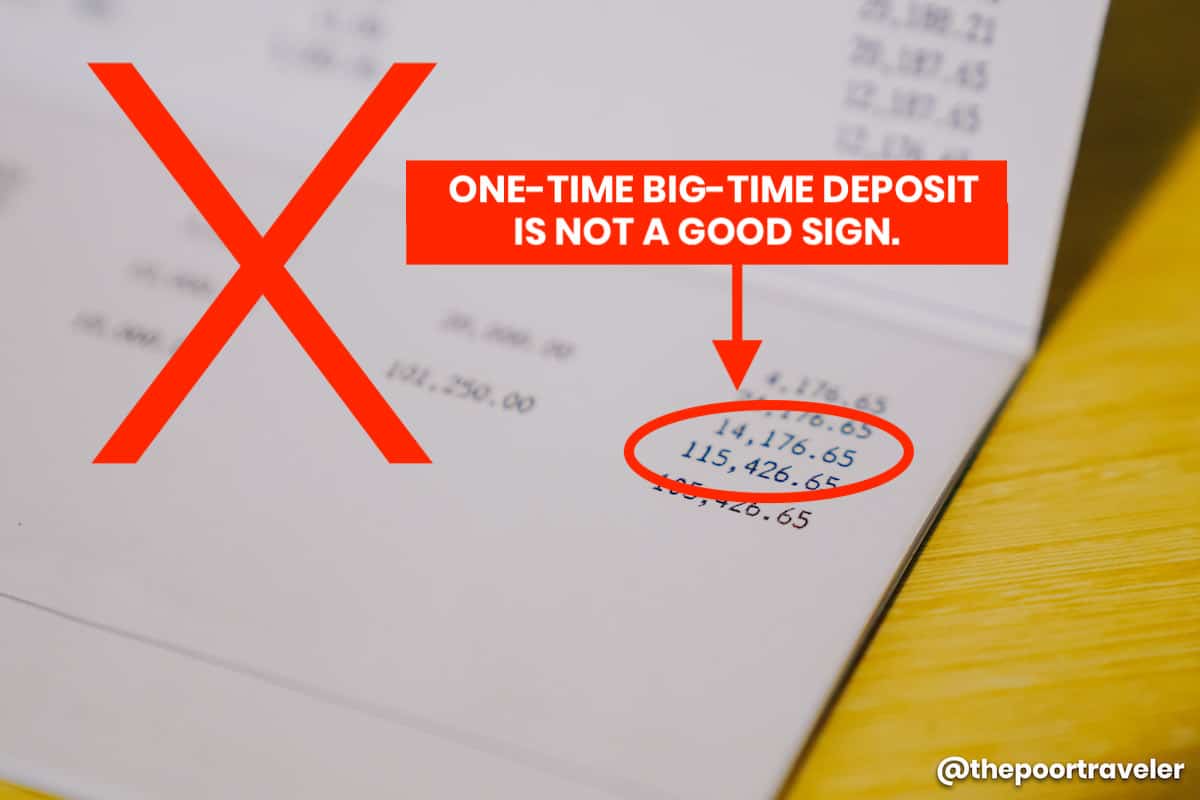
Like I said earlier, embassies examine the details of your financial documents. According to a friend who used to be a visa officer, they are trained to spot inconsistencies and anomalies, and it’s pretty easy to do. If they see that some things don’t match or there are unusual transactions, eyebrows will raise.
Yes, you can. However, it does not always mean it will increase your chances of approval.
For Japan, this can work. When applying for a Japan visa with a sponsor, the applicant may choose to not submit a bank certificate and provide proof of funds from the sponsor instead. The burden shifts to the sponsor.
However, for most other countries, having a sponsor does not exempt you from show money and could even hurt your application. For most visas like Korean, Canadian, and Schengen, even if you have a sponsor, you will still need to submit your own bank documents. You may have the means to support your trip financially through someone else, but they still need to see show money to confirm your stability and rootedness.
See previous section.
It’s going to be a very risky move. A newly opened bank account can raise some red flags because it looks like you only opened one to apply for a visa, which is a no-no.
If you plan on visiting visa countries in the future, even if you’re not applying for a visa anytime soon, it’s best to open a bank account as soon as you can. We discussed this in a separate post: LONG TERM PREPARATIONS FOR VISA APPLICATION!
Before anything else, let’s define what a payroll account is.
A payroll account can be either:
If you’re an employee and you’re referring to the latter, it still depends on what type of payroll account you have. But YES, I have tried using it for visa application a few times back when I was a corporate slave and never had any issues with it. I think it’s important that your payroll account meets the following:
If not your payroll account doesn’t have enough funds, you can submit it along with your other accounts to make a stronger case. I like submitting my payroll account because it shows where my money is coming from and is consistent with my COE and ITR.
If you’re an employer and you’re referring to the former, I have no idea if you can use this account. I have not done it (as an employer).
YES. I do this most of the time.
In the past few years, I have been using two joint accounts when I’m applying for a visa: one with my business partner (AND account) and the other with my mom (OR account).
I have used the OR account on its own before and had no issues. But I have never used my AND account on its own. I use it together with other accounts, so I am not sure if an AND account is acceptable as a stand alone proof of funds.
Yes, you can. I do it most of the the time. This paints a clear picture of my finances, so the embassy could easily understand. I have at least three bank accounts now:
I submit all three accounts when I’m applying for a visa. Usually, at least. Sometimes, when I get lazy, I just submit one or two.
Sometimes. It’s hard to tell whether or not they will ask you for show money. But yes, they do in certain cases.
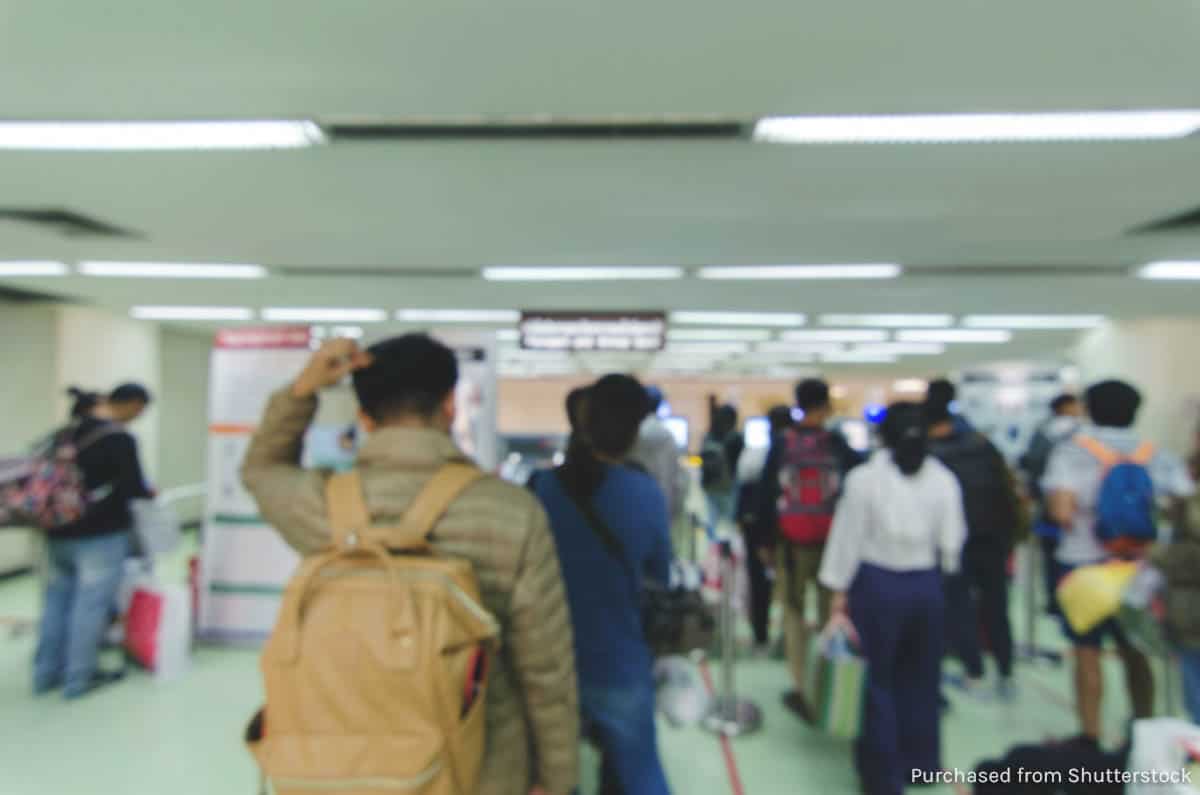
According to the Bureau of Immigration, financial capability is NOT a requirement for traveling abroad. However, if they suspect that the traveler is not telling the truth about their purpose of travel, they may need you to undergo secondary inspection.
According to a memorandum entitled Guidelines on Departure Formalities for International-Bound Passengers, released by the Bureau of Immigration to their airport and seaport officers in 2012, in the secondary inspection, the traveler will be evaluated based on age, educational attainment, and… *drum roll* financial capability to travel.
To be clear, NOT ALL travelers will undergo a secondary inspection, only those who are suspected of having a different purpose of travel. According to the bureau (as told to a news agency), tourists who are more likely to be questioned are:
If you’re unemployed and it’s your first time to travel abroad, there’s a big chance you will need to undergo secondary inspection and be asked to present proof of financial capability.
Get a sponsor who can shoulder your travel expenses. This applies to students, fresh graduates, or unemployed individuals who have no capability to support the trip financially.
Ideally, the sponsor is a Filipino immediate relative. You should have the following notarized documents ready:
You can merge these two items into just one document — an Affidavit of Support and Guarantee — to reduce notarization fees.
Sometimes the Immigration Officer won’t ask for it, but it’s better to come prepared.
However, note that having the above papers does not guarantee getting through. It will increase your chances, but it’s still up to your demeanor and answers, and the judgment of the Immigration Official.
Maybe. According to a friend who is an Immigration Officer, in addition to the Affidavit of Support and Guarantee, the traveler must also provide proof that the sponsor can support the trip. This may be the sponsor’s bank documents (show money), Certificate of Employment, or ITR.
If your sponsor is a foreigner or a Filipino based abroad, there may be additional complications. Please check the links below for more details.
Again, whether or not they will ask for proof of funds depends solely on the judgment of the Immigration Officer.
It depends on the country you’re visiting. For example, as a matter of policy, Thailand requires foreign visitors to have at least 10,000 baht per person or 20,000 per family (or the equivalent amount in another currency) in cash upon entry.
Another example is Taiwan, which requires visa-free Filipino travelers to have proof of sufficient travel funds in the form of cash, credit cards, travelers checks, or similar forms. They don’t really say how much exactly.
However, it is not always implemented. Our team has been in and out of Thailand and Taiwan but none of us were asked how much cash we carry or how much budget we allocate for the trip.
That said, for countries that have a show money rule, it is always best to comply, just in case they ask. It’s better to have it and not need it than need it and not have it.
I personally have been asked about funds in other countries. In the Maldives and in another country — I can’t remember if it was Australia or Singapore — I was asked how much money I had with me. I answered truthfully and shared that I also had a credit card and an ATM card. In both occasions, they let me through without any more questions.